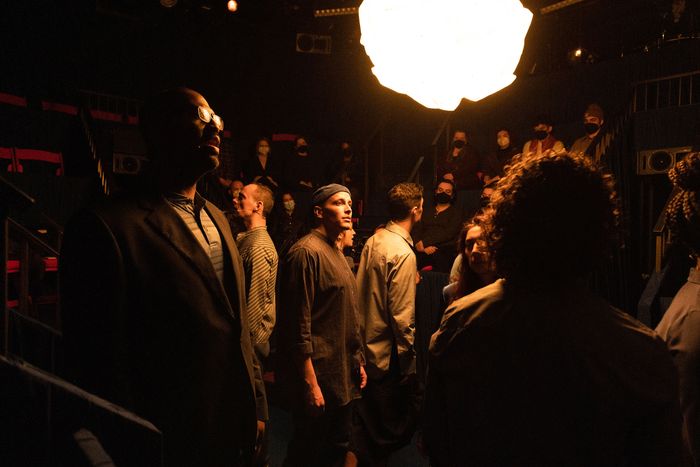
At some point during the past two years, my inner category-maker gave up. Two years of discarding the usual definitions of theater (liveness, in-person-ness, repetition) left me willing to believe that anything qualifies. So although Heather Christian’s beautiful Oratorio for Living Things would normally be considered a piece of music — it’s there in the title: It’s an oratorio — it won’t be hard to convince yourself that it’s a drama. Sure, there are no characters or plot, and some of it is in Latin (good luck!), but theater-makers made it, and their hands still guide us down those familiar paths.
Christian wrote and performed two of my favorite shutdown experiences: I Am Sending You the Sacred Face (a 40-minute lip-synced drag opera about Mother Teresa) and the audio work Prime: A Practical Breviary. Her librettos use plain language to create bright, painful portraits of bearing up under sorrow. “I am keeping the room vacant,” Mother Teresa sings in Sacred Face about a God she has lost faith in. “He won’t come unless it’s spotless.” Christian’s music is bluesy, neo-roots, piano-heavy fusion that builds to gospel heights. It has a stride to it, perhaps because the melody frequently reduces itself into a single, insistent note as the singers kind of … shout ecstatically at the top of their range. Oratorio is one of the first times I can remember her not performing in a work herself, but the qualities of her voice have infiltrated the 18 musicians and singers in the tiny Greenwich House Theater — you can hear her pile-driver twang in the way they all use their instruments.
The producing theater Ars Nova has a habit of changing a space utterly for its projects — they mounted the original version of Natasha, Pierre, & the Great Comet of 1812 by converting their tiny Midtown venue into a nightclub, for instance. This relatively capacious house has also been transformed, this time by set designer Kristen Robinson, who’s rebuilt the stage as a cramped wooden oval with seating risers built up almost into the lighting grid. It’s like an operating theater, with a paper structure suspended low in the middle where the body might be. This soft, lobed object glows — it looks like Isamu Noguchi’s version of an atom. Director Lee Sunday Evans puts the band behind the high back row, and the singers spend most of the oratorio walking up and down the stairs all around us. They are almost always facing that central lamp. If it is a nucleus, they are the electrons in its orbit, moving from valence to valence.
An oratorio, Christian explains in the handily provided libretto, is “religious-adjacent music” dedicated to a theme the composer thinks is holy. “Tonight,” she says, “the holy thing is Time.” The first sequence is in Latin, and while there’s a translation in the libretto, it’s meant to roll over you, its quaestiones part of a pulchra mundi. This linguistic disorientation makes the first words in English bang straight into your mind — “sun into sugar, sugar into food,” the chorus sings, and you realize the oratorio is dealing with the capillary rhythm of photosynthesizing life. The music operates in densely woven rounds and patterns (some of it Christian, some of it musical director Ben Moss, some of it the ten other credited orchestrators), creating a sense of overabundance and sonic muchness. The most striking sequence is one that tots up human time, tabulating the days and hours and minutes of a life. “Eleven hours wondering if something that you’re doing is normal / nineteen hours twelve minutes deciding to quit.” (There is a pause.) “Seventeen minutes quitting.”
For Christian, time is also about connection, because contact pauses time’s stream. As they move up and down the stairs, the singers sometimes catch our eyes. Remembering the piece now, it was those glances that stopped the show’s headlong 90 minutes, which were otherwise a whitewater cataract of sound and meaning. The middle section is the “Memory Harvest”: Christian took voicemails about people’s first memories and changed them into sweet, almost always funny lyrics. The final movement deals with the elemental ingredients, hydrogen and helium, which she calls the “burning and eternal” parents of everything, everywhere. I have always been a little annoyed by dramatists’ slipshod use of scientific principles — perhaps because I’ve seen too many plays that shoehorn quantum theory into human relationships. (Heisenberg’s uncertainty principle will not help you understand heartbreak.) But Christian smashes through that old prejudice of mine. As her smiling performers, all in beautiful voice, sing that we are “made for collision” because of our atomic makeup, I believed it. The Oratorio for Living Things uses music to dissolve the listeners into their fundamental particles, then uses simple choreography and intimate eye contact to reorganize us. We have spent so much of the last two years being thrown centrifugally out of our own systems — so Oratorio puts you into the middle of one, and spins you back into place.
Oratorio for Living Things is at the Greenwich House Theater through April 17.


